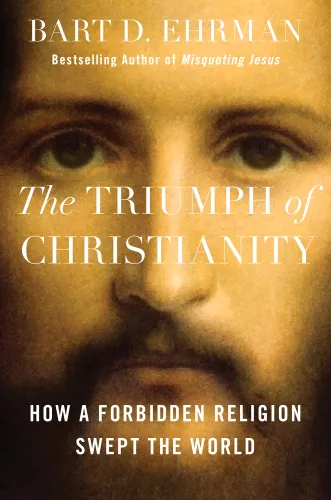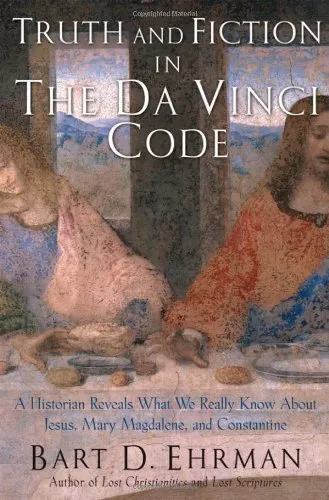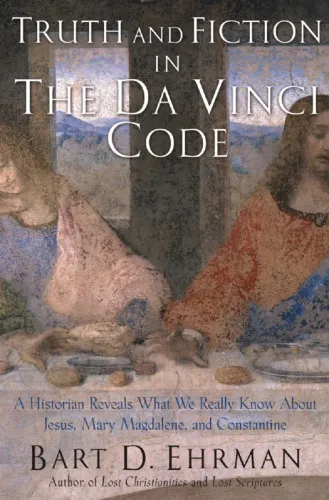The Triumph of Christianity: How a Forbidden Religion Swept the World
4.5
Reviews from our users

You Can Ask your questions from this book's AI after Login
Each download or ask from book AI costs 2 points. To earn more free points, please visit the Points Guide Page and complete some valuable actions.Related Refrences:
Introduction to "The Triumph of Christianity: How a Forbidden Religion Swept the World"
Bart D. Ehrman's "The Triumph of Christianity: How a Forbidden Religion Swept the World" delves into one of the most fascinating transitions in the history of religion: the rise of Christianity from a small, obscure sect to a powerful faith that shaped the Western world. This book endeavors to unravel the complexities behind this transformational ascent, dissecting historical events, socio-political influences, and theological shifts that contributed to Christianity's monumental rise.
Detailed Summary of the Book
The book spans the initial emergence of Christianity within the Roman Empire, a time when the belief was considered treacherous and its followers persecuted. Starting with the life and teachings of Jesus, Ehrman examines how Christianity appealed to a diverse demographic, cutting across class, gender, and ethnic lines. The initial chapters explore the missionary journeys of key figures like the Apostle Paul and how the Christian message spread through these concerted and often dangerous efforts.
Further into the narrative, Ehrman analyzes the socio-political and cultural landscapes that affected this rapid expansion. He scrutinizes how Constantine’s conversion and the subsequent Edict of Milan decriminalized the faith, leading to profound changes in how Christianity was perceived and practiced. The book discusses the ensuing theological debates and councils that sought to define orthodoxy, laying the groundwork for what would become institutionalized Christianity.
By highlighting lesser-known figures and lesser-examined catalysts of growth, Ehrman provides a comprehensive look at Christianity’s reach and adaptation across different territories and epochs. His methodical examination offers readers a nuanced perspective, resisting the temptation to oversimplify the story into one of mere divine inevitability. Instead, it is a testament to strategic human decisions and a reshaping of beliefs tailored to resonate with various peoples and cultures across time.
Key Takeaways
- The growth of Christianity was not just a religious phenomenon but also deeply intertwined with the political, social, and economic changes within the Roman Empire.
- Conversion to Christianity involved not only personal religious experiences but also strategic social alliances and adaptations.
- The shift from persecution to acceptance under Constantine was a pivotal moment that greatly accelerated Christianity’s rise.
- Christianity's emphasis on inclusivity and universality played a significant role in its widespread appeal and eventual dominance.
- Ehrman dispels the myth of God's direct intervention as the primary reason for Christianity's success, emphasizing human agency and historical context instead.
Famous Quotes from the Book
"The triumph of Christianity was not primarily about the number of its adherents but about the implications for culture, life, and governance throughout the world."
"Christianity did not rise because it offered a new nihilistic vision or merely because it showed the flaws of Roman polytheism, but because it provided a community, a sense of belonging, and a way of seeing the world that was hard, if not impossible, to resist for many."
Why This Book Matters
"The Triumph of Christianity" is crucial for understanding how historical, cultural, and individual factors drive religious transformations. Ehrman’s scholarship provides insight into how Christianity reshaped prevailing social norms and power dynamics, ultimately influencing the spiritual and temporal worlds profoundly. This book does not just cater to historians or religious scholars but offers valuable lessons for modern readers seeking to comprehend how ideas and beliefs can radically change human societies.
Furthermore, Ehrman’s work challenges readers to consider the active human role in religious change, encouraging a deeper appreciation of history as a tapestry woven not just by divine decree but by human hands and hearts. As religions continue to alter lives globally, understanding such monumental shifts in history remains more relevant than ever.
Free Direct Download
You Can Download this book after Login
Accessing books through legal platforms and public libraries not only supports the rights of authors and publishers but also contributes to the sustainability of reading culture. Before downloading, please take a moment to consider these options.
Find this book on other platforms:
WorldCat helps you find books in libraries worldwide.
See ratings, reviews, and discussions on Goodreads.
Find and buy rare or used books on AbeBooks.
1473
بازدید4.5
امتیاز50
نظر98%
رضایتReviews:
4.5
Based on 0 users review
"کیفیت چاپ عالی بود، خیلی راضیام"
Questions & Answers
Ask questions about this book or help others by answering
No questions yet. Be the first to ask!




